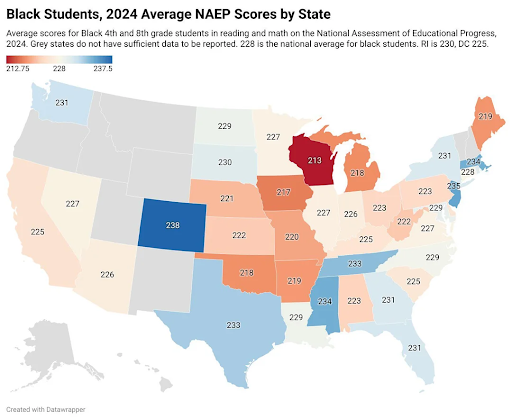Wisconsin finds itself at the bottom of national rankings for Black student academic performance, with the most recent National Assessment of Educational Progress (NAEP).
The findings highlight what education experts call an urgent crisis and raise questions about the state’s long-standing racial achievement gap.
Wisconsin’s Troubling Numbers
The 2024 NAEP results revealed that Wisconsin’s Black 4th graders scored last in both reading and math proficiency, with only 8 percent scoring proficient in reading and just 5 percent in math.
The NAEP website includes an interactive tool that allows users to filter results by state and student group, and when those numbers are broken down, Wisconsin emerges with some of the largest racial achievement gaps in the country. Only the District of Columbia scores worse—and because it is not a state, Wisconsin ranks last among all states.
The state’s White–Black score gap in 8th grade mathematics was 50 points, the widest in the nation aside from the District of Columbia, which is not a state. Among 4th graders, the gap measured 47 points, also ranking near the top. Reading scores reflected similar disparities: 4th grade students posted a 45-point gap, while in 8th grade the gap stood at 39 points.
Milwaukee Public Schools, where nearly half of students are Black, performed even worse, with just 9 percent of 4th graders and 15 percent of 8th graders reaching proficiency in reading.

Achievement gaps widen despite high funding levels in Milwaukee schools
The Wisconsin Policy Forum reports that when fully phased in, the April 2024 referendum of $252 million will increase Milwaukee Public Schools’ per-pupil revenues by nearly $4,000 over four years, pushing them above $17,000 per student. This figure reflects only core revenues and does not include additional spending streams such as federal Title I aid and other categorical grants, which vary year to year.
When federal funds are included, MPS brings in $24,682 revenue dollars per student. Taken together, the numbers show that Milwaukee Public Schools are already among the most well-funded districts in the state, making clear that persistently low outcomes—especially for Black students—cannot be explained by lack of money alone.
The Literacy Reform Push
In response to these alarming trends, Republican State Sen. Duey Stroebel spearheaded the Right to Read Act, which became law as 2023 Wisconsin Act 20. The law dedicated $50 million toward early literacy programs, replaced outdated “three-cueing” reading methods with evidence-based instruction, and created a new Office of Literacy within the Department of Public Instruction. It also provided for 64 state-funded literacy coaches to support schools across Wisconsin.
In 2024, Stroebel followed up with additional legislation—Senate Bill 990—designed to reinforce Act 20 by requiring early literacy training for educators. Supporters argue these reforms are necessary first steps, but they acknowledge that broader structural changes are needed if Wisconsin is to close its racial achievement gaps.

